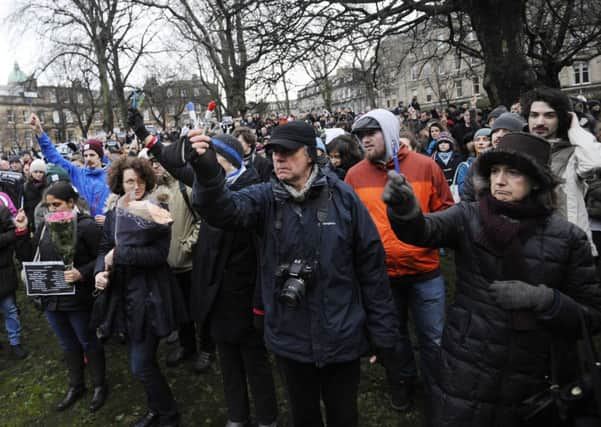Lesley Riddoch: Sadly, we are not all Charlie


After last week’s murders in France, that has extra resonance. The men who shot 17 people last week were completely immersed in their world and spring-loaded to take offence on behalf of the God and religion they followed. Mockery was enough to justify deadly rage.
Now, across Europe, a volatile cocktail of emotions is brewing in response. There is fear and anger. The Charlie Hebdo attack happened across the English Channel to a satirical magazine with a history of provocation and a police guard. But it could happen here. British troops and forces were involved in the illegal invasion of Iraq and in Afghanistan. Our government has allowed the sale of weapons to dictators and was part of a wider western refusal to back relatively moderate forces in Syria against president Assad since oil supplies were not directly at stake.
Advertisement
Hide AdAdvertisement
Hide AdShould that make British citizens “legitimate targets”? Of course not. Does that make it hard for Britain to occupy the moral high ground? Yes. But only because no state in the world can do so.
There is guilt. We all know where we stand on the killing of journalists, policemen and women and bystanders. That is just wrong. But when politicians turn these murders into an attack on western society, or indeed freedom itself, we may start to feel uncomfortable.
Look across the world – others are hurting more. Sometimes at the hands of Islamic extremists, sometimes at the hands of dictators, regimes or situations our governments have backed or chosen not to confront.
Last Sunday, one of Africa’s most senior church leaders accused the West of ignoring Boko Haram whose members shot, burned and hacked their way through the north-eastern Nigerian city of Baga last week, killing 2,000 people – mostly women, children and old people who could not run away. On the same day as the Charlie Hebdo killings, 37 people died and 66 were injured in an al-Qaeda bomb blast in Yemen. And on Saturday, 19 people were killed by a bomb strapped to a ten-year-old girl in the Nigerian city of Maiduguri. It’s believed she did not know she was wired to kill.
Archbishop Kaigama highlighted the stark difference between the West’s willingness to act in Paris and its inaction over militant Islamist attacks in Africa. He’s right. Last week’s killings in Paris were appalling. But if we react only to attacks in the developed world, we distort our world view, abandon those closest to threat and send a very dangerous message. That attacks against our world matter, they register, they hurt. Attacks against others do not.
If the “developed” world declares war on extremists in response only to the Paris killings, it will confirm western double-standards and ensure European capitals become the focus for more attacks. Indeed, they already are. A German newspaper which reprinted Charlie Hebdo’s Muhammad cartoons was the target of an arson attack this weekend. The fire was easily put out and there were no casualties. The regional tabloid daily, the Hamburger Morgenpost, splashed three cartoons on its front page under the headline “This much freedom must be possible”.
Ironically, many Europeans have been able to question the taste of Charlie Hebdo cartoons precisely because the magazine’s work has been shared online for the wider public to judge. That’s the “upside” of our cultural emphasis on freedom of expression.
Nonetheless, our news values are inescapable. Last week, white, Christian French folk came first, French Jews came second, Africans and Arabs vied for a distant joint third. Are readers as blinkered and uncaring? Actually, I think not.
Advertisement
Hide AdAdvertisement
Hide AdMost folk understand the challenge for secular western society is not just combating external threats and isolating those in Britain intent on harming others. The big challenge is to move away from a polarised, over-simplified world view complete with strong leaders, loyal followers, faith, certainty, sides, us, them, never and always towards a more conditional, tolerant, diversity-embracing, empathetic, constantly assessing and intelligent society that’s wary of generalisations, eternal truths and scapegoats.
The trick, of course, is to stay calm without becoming a complacent, self-indulgent “anything goes” culture that’s lost the ability to care deeply about anything. Mercifully, though, that doesn’t seem to be happening.
At yesterday’s enormous, peaceful unity rally in Paris, Jewish and Muslim leaders shook hands with one another. Online, trending articles were: “Why you shouldn’t blame all Muslims for Charlie Hebdo” and “Why white Australian men must apologise for Rupert Murdoch” – a reference to the tycoon’s comment that Muslims must “recognise and destroy their growing jihadist cancer” or be “held responsible”. Presumably that generalisation includes the Muslim man hailed as a hero for hiding hostages in the supermarket’s walk-in refrigerator and the Muslim policeman killed whilst guarding the Charlie Hebdo office.
It seems citizens are able to cope with shades of grey, nuance and the need to keep exercising judgment in the knowledge that favoured people, events, papers, columnists and causes are only sometimes right. But our public culture is fast becoming a black and white world where every small disagreement is a “clash of cultures” and every small mistake an act of betrayal. The words rage, fury, anger, row, nightmare, catastrophe and tragedy are used every day to whip up sales by whipping up loyalty. And to whip up loyalty they must activate fear or hatred of the “other” – folk who follow the other religion, football team, set of cultural practices, political party or side in the referendum campaign.
All too often these days, personal identity is increasingly derived from uncritical worship or attachment to a group, hero, brand, creed or belief. We are what we follow – and that conflation is encouraged by almost every bit of our political and corporate world.
So steady. We cannot be Charlie or fight Boko Haram. But we can stay broad-minded, understand that the whole world is now our world and demand our governments do the same.